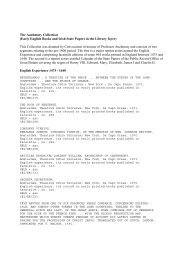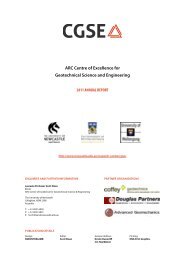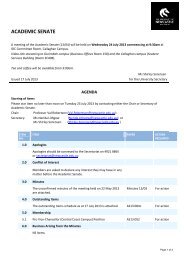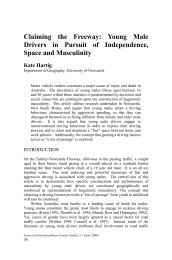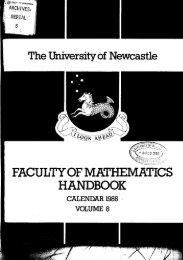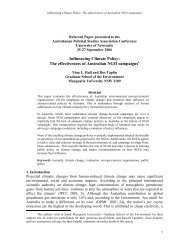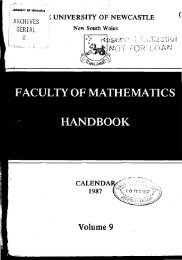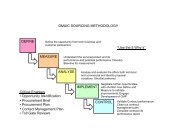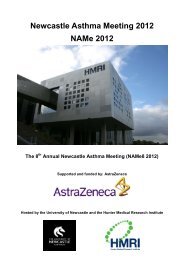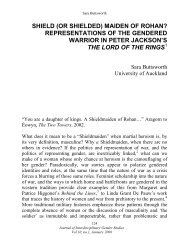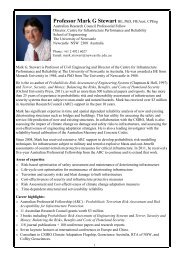n - University of Newcastle
n - University of Newcastle
n - University of Newcastle
Create successful ePaper yourself
Turn your PDF publications into a flip-book with our unique Google optimized e-Paper software.
THE WIUDHaEI DULECT. 59<br />
The examples given above show that the variations in declension<br />
arise from assimilation. Thus, when r or I is the last sound <strong>of</strong> the<br />
word, these letters assimilate the initial consonant <strong>of</strong> the postfix.<br />
If the vowel <strong>of</strong> the last syllable is i, either ending the worcl or<br />
syllable or followed by n, euphony adds the sound <strong>of</strong> y to the cc,<br />
<strong>of</strong> the postcx ; thus, dya, clyzt, dyi appear instead <strong>of</strong> da, clzl, A.<br />
When i is ejected, this rule does not apply. The ejection <strong>of</strong> i pre-<br />
ceded by a takes place in the X0112. 2 ancl in the Locative.<br />
If the possessi~re pronoun is put before its nou~~, it is declined<br />
with the same termination as the noun. But the nlore common<br />
practice is to put the pronoun behincl it in an abbreviated form as<br />
a postfix; as, buraigundi, ' to my boy'; buraignnu, 'to your<br />
boy'; buraigugula, 'to his boy.' ' To my boy,' with the possessive<br />
pronoun detached, would be g a cl clig u bur ai gu.<br />
2. THE COXPARISON OF ADJECTIVES.<br />
There is no comparative form <strong>of</strong> the adjective, nor, properly<br />
speakin,, a superlative, thougli certain terminations, such as bag<br />
' ~ery,' b am b i la g ' exceedingly,' express a superlative or a very<br />
hlgh quality <strong>of</strong> the thing. Hence the comparisons on things are<br />
expressed in an indistinct manner. To say, 'this is better than<br />
that,' wouIcI be ginna marog, wirai gannalla; Zit., 't>his is<br />
good, not that'; nila garamba€, gainguagual, lit., 'this very<br />
good, that also.' But to say, 'thisis the best <strong>of</strong> all,' woulcl be nila<br />
marogbangan, wirai igianna ginnallal; lit., 'this is good<br />
indeecl, these are not like it.' Acljectives may be cleclinecl like<br />
nouns, but in syntax they are not always cleclined.<br />
3. THE VERB.<br />
The study <strong>of</strong> the verb is attended with some difficulty on account<br />
<strong>of</strong> its many tenses ancl modifications ; it is, homever, conjugated<br />
in a very regular manner, and, excepting the imperative,<br />
it is non-inflexional throughout all its tenses, all the persons, both<br />
singular and plural, haring the same form. The conjugations<br />
may be reduced to about five, nor do these vary much, and, so far<br />
as they do vary, they follow strict rules according to the termination<br />
<strong>of</strong> the last syllable and the vowel preceding it.<br />
The verbs, then, are arranged in co~ljugations according to the<br />
terminations <strong>of</strong> the preseut tense <strong>of</strong> the indicative ; thus :-<br />
I'ernzinations <strong>of</strong> Conjzcgatio?zs.<br />
1. -Anna 07. -Ina ; 5. -unna ; 3. -inga ; 4. -arra ; 5. -irra.<br />
The vowel <strong>of</strong> the penultimate syllable may be said to terminate<br />
the radical part <strong>of</strong> the verb, which is retahzecl in a11 the tenses<br />
and moditications, whilst the reaainclcr is liable to be thrown <strong>of</strong>f.<br />
Those tenses where a becomes ai are oniy apparent evceptiolls to<br />
the rule.



